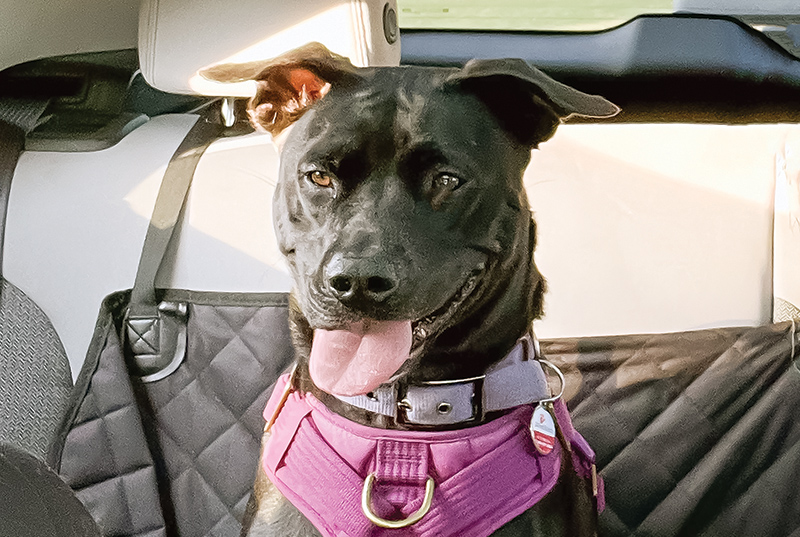Remember the days when you could hop in the back seat with nothing more than your rabies certificate if you wanted to accompany your owner on a trip to the US? As of Aug. 1, 2024 additional planning will be a necessity if you want to bring your dog to the US. Tinkess Photo
SDG – If you are a dog owner and your travels occasionally take you into the US along with your four-legged companion, then as of Aug. 1, 2024, things are going to become a bit more complicated. If you don’t take the time to understand the new regulations, it can also become quite expensive.
The U.S. Centres for Disease Control and Prevention (CDC) recently announced that they will be updating regulations on the importation of dogs into the United States. This regulation change will directly impact Canadians who travel to the United States with their pets.
As of Aug. 1, 2024, all dogs entering the United States must:
- Appear healthy upon arrival
- Be at least six months of age
- Be microchipped and
- Be accompanied by a CDC Dog Import Form online submission receipt
In addition, for dogs that have been only in countries that are dog rabies-free or low-risk during the 6 months before entry, (Canada is one such country) will also require one of the following:
- Certification of Foreign Rabies Vaccination and Microchip form, including the endorsement by an official veterinarian of the dog rabies-free or low-risk country where the dog has been located; And either (1) a valid rabies serology titer (a serum neutralization (inhibition) test that measures the ability of rabies specific antibodies to neutralize rabies virus and prevent the virus from infecting cells.) or (2) veterinary records (which list the microchip number) for the dog from the exporting country for the previous 6 months. The form must be completed within 30 days before arrival to the United States.
- Certification of U.S.-Issued Rabies Vaccination form that was endorsed by USDA before the dog departed the United States
- Valid USDA-endorsed export health certificate listing the destination as the dog rabies-free or low-risk country from which the dog is returning
- Certification of Dog Arriving from DMRVV-free or Low-Risk Country into the United States form endorsed by an official veterinarian in the exporting country; and veterinary records* (which list the microchip number) for the dog from the exporting country for the 6 months before traveling to the U.S. The form must be completed within the 30 days before entering the United States.
- Foreign export certificate that documents the dog is at least 6 months of age, lists the dog’s International Organization for Standardization (ISO)-compatible microchip number that has been endorsed by an official veterinarian of the exporting country; and veterinary records* (which list the microchip number) for the dog from the exporting country for the previous 6 months
It is highly recommended that travellers start the process early in order to gather all the required documentation and photos. Due to the high volume of applications the CDC receives, it can take up to 30 business days or 6 weeks for the CDC to process a complete a valid permit application.
A complete list of new requirements can be found on the CDC website (cdc.gov/importation/bringing-an-animal-into-the-united-states/dogs-entering-us-after-august-1.html).
There’s also an online tool called ‘DogBot,’ meant to help travellers determine what rules apply to their dogs.
In Canada, the Canadian Food Inspection Agency (CFIA) has similar responsibilities to the CDC, and they are working together to finalize the process and the documents needed for dogs travelling from Canada to the US.
According to their website, “the CFIA continues to actively work with the CDC to develop a specific process that will be used for dogs travelling from Canada to the U.S.”
Dogs that do not meet all entry requirements or do not have accurate and valid forms will be denied entry to the United States and returned to the country of departure at the importer’s expense. These requirements apply to all dogs, including service dogs and dogs that were born in the United States.

Terry Tinkess is a professional photographer, educator and journalist. He has been making a living with a camera and keyboard since 1999 and has been featured in such publications as The Ottawa Citizen, Cornwall Standard Freeholder, The Globe and Mail, The Miami Herald, Ottawa Construction News, The Ontario Construction Report, Ontario Home Builder Magazine, Reed Construction Data, Canadian Potato Business and most recently, The Record and Eastern Ontario AgriNews. Terry lives in Ingleside, Ontario with his wife Brenda, Mia the anxious Pittie and cats Wally and Chubbers.











